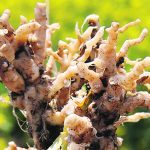Clubroot can cause yield losses of as much as 60 to 90 percent in canola, which is one of the most valuable cash crops in Canada, said the statement. Canola exports provided $12.9 billion in 2022 to the Canadian economy, with $4 billion of that total coming from Alberta.
Tag Archives clubroot
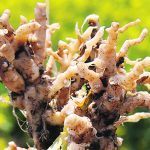
Adding silicon to soil can help control clubroot
Scientists have found that adding silicon to soil can boost resistance to clubroot in canola by up to 46 percent, adding to known benefits for plants such as improving resilience to extreme heat and drought. “There are significant canola crop losses in the Prairies due to clubroot,” said Nataraj Kav, associate dean of the Faculty […] Read more
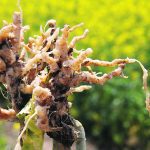
Research leads to clubroot resistance breakthrough
Clubroot is a soil-borne disease of cruciferous plants, including cabbage and canola.
Fengqun Yu of Agriculture Canada’s Saskatoon Research and Development Centre is leading a team of scientists dedicated to finding the genetic root of the clubroot problem.
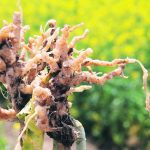
Producers to receive pest aid
Saskatchewan has rolled out its pest biosecurity program for the next five years. The $19.5 million program covers plant concerns such as clubroot, prohibited and noxious weeds, gophers, beavers and rats. It is funded by the province and Ottawa and will be delivered by the Saskatchewan Association of Rural Municipalities. It funds a plant health […] Read more
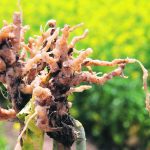
Spread of clubroot steady but slow in Sask.
Clubroot is not well established in wide swaths of farmland in Saskatchewan, unlike regions of Alberta and Manitoba. The Saskatchewan government annually releases its clubroot distribution map that outlines rural municipalities where clubroot has been identified. Clubroot is a soil-borne disease that can cause significant canola yield loss when pathogen levels are high. “This year, […] Read more
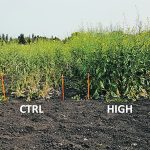
Study finds lime can combat clubroot
University of Alberta plant pathologists say it could be another tool to improve sustainability and help with resistance
Can lime reduce clubroot in canola if environmental conditions and timing are right? Yes, say researchers. “Now we know, when all things are right, lime can significantly reduce the disease severity and have quite impressive results,” said Stephen Strelkov, a University of Alberta plant pathologist who co-authored the study. U of A researchers tested two […] Read more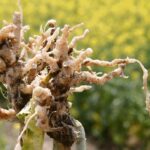
Number of fields infected with clubroot increases in Sask.
Clubroot appeared in 24 more Saskatchewan fields in 2020, according to the map released Jan. 11. Visible disease has now been confirmed in 75 canola fields since 2017. Also last year, the pathogen was detected in another 18 fields that didn’t have symptoms, for a total of 29. Provincial plant disease specialist Alireza Akhavan said […] Read more
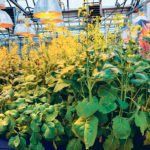
Integrated management advised for clubroot
Resistant varieties, hydrated lime applications and improvements to weed management appear to be beneficial
RED DEER — New preliminary research suggests farmers will be able to better manage clubroot if they integrate a number of practices. The University of Alberta trials, led by plant science masters student Brittany Hennig, indicates that producers who use multiple strategies, like growing resistant varieties, using lime to spot-treat, and better controlling weeds, will […] Read more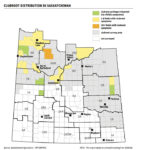
RMs told they play key role in clubroot battle
The key to clubroot management is to keep pathogen levels low to allow continued production in infested fields
Rural municipalities with clubroot bylaws are advised to stay quiet if the pathogen is discovered. “From an RM’s perspective, if clubroot is found in their RM, we do really encourage them to keep that information confidential,” said Barb Ziesman, provincial plant disease specialist for Saskatchewan Agriculture. Ziesman spoke at the Saskatchewan Association of Rural Municipalities’ […] Read more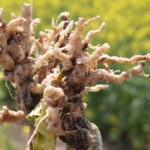
Alta. county takes new approach to clubroot
A first-of-its-kind clubroot management plan is going ahead in northeastern Alberta, helping farmers in the region mitigate the spread of the notorious disease. The Smoky Lake County plan takes a different approach than that of other counties, requiring producers to sit down with a crop adviser and devise an action plan to mitigate clubroot. “We […] Read more

